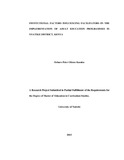| dc.description.abstract | The purpose of the study was to examine the institutional factors influencing
facilitators in the implementation of adult education programmes in Nyatike
District Migori County, Kenya. Six research questions were formulated which
includes, instructional resources, professional and academic qualification of adult
education facilitators, instructional strategies, use of the syllabus in the adult
implementation, language used in facilitating learning and influence of
supervision and monitoring. The study adopted a descriptive survey design to
establish the institutional factors influencing facilitators in implementation of
adult education programs .The study targeted all 13 adult education centre
managers, all the 33 adult education facilitators where census survey was used
and 225 adult learners who were sampled using systematic random sampling.
Questionnaires were used as instruments of data collection likewise to focus
group discussion guide and interview guide. Quantitative data were analyzed by
use of descriptive statistics supported by frequency distribution, tables and
percentages. Qualitative data were analyzed by use of content analysis through
categorizing and indexing of responses. The questionnaires were tested to
ascertain the appropriateness of items in obtaining information to minimize
potential percentage of errors when carrying out the research to test validity .To
determine reliability of instruments, a prior test was carried out for each
questionnaire during piloting. The piloted questionnaire were scored manually
and then subjected to computing using statically package for social service in
order to prove its reliability. The co-efficient in the regression showed that
instructional resource, academic and professional qualification, instructional
strategies, use of the syllabus, language used and supervision and monitoring
showed positive relationship in the influence of facilitator’s implementation of
adult education. Conclusion for the study indicated that adequacy of instructional
resources influenced facilitators in the implementation of adult education,
academic and professional qualification of facilitators and managers enhances
implementation of adult education, syllabus coverage is superb and thus good
performance, language used in implementation of adult education is a factor and
monitoring and supervision should be regular and timely to enhance
implementation. The stakeholders in education should therefore build more adult
education centers which are equipped, enhance training and capacity building for
facilitators and managers, ensure instructional strategies focuses the learners and
ensure that supervision is regular and timely to ensure that the implementation is
effective and qualitative in all the adult education centers. | en |

